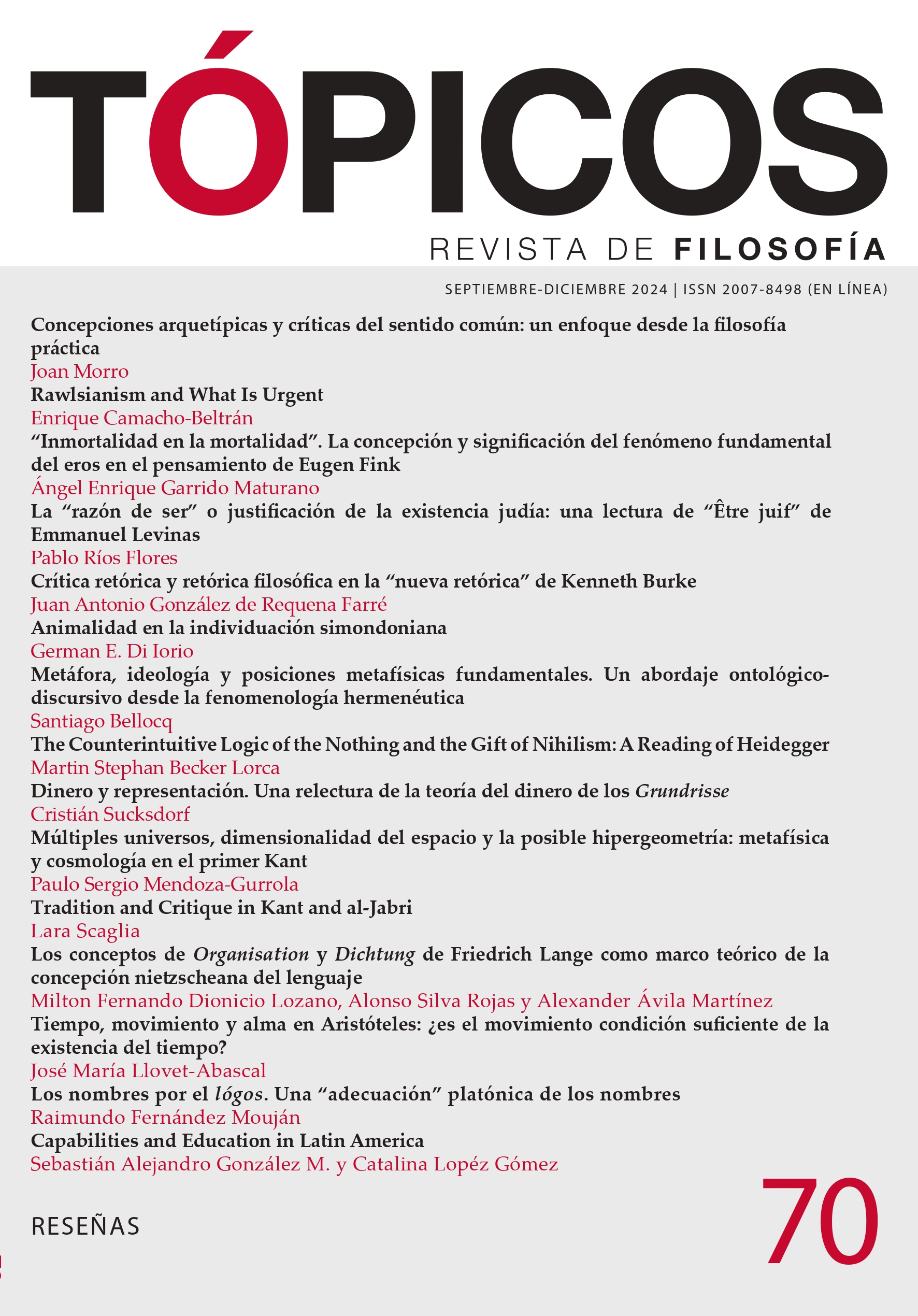Publicado 2024-08-15
Palabras clave
- Platón,
- Crátilo,
- nombre,
- lógos,
- lenguaje
- adecuación ...Más
Derechos de autor 2024 Tópicos, Revista de Filosofía

Esta obra está bajo una licencia internacional Creative Commons Atribución-NoComercial-SinDerivadas 4.0.
Cómo citar
Resumen
En el Crátilo, Platón aborda la cuestión de la orthótes onomáton, la “exactitud” o “adecuación” de los nombres con respecto a aquello que nombrarían. Dos posturas se ponen en juego sobre tal adecuación (el convencionalismo de Hermógenes y el naturalismo de Crátilo), las cuales son desmontadas por el Sócrates platónico. ¿Pero solo dos? ¿No hay acaso en el Crátilo aunque sea la indicación de una posible “adecuación” platónica? Este artículo muestra esa posible “adecuación”. Para cumplir tal objetivo, se investiga la diferencia entre el nombre (o nombre “natural”) y la palabra, la necesidad de anclar la denominación en las esencias, y se muestra sobre todo que es necesario pensar la cuestión del nombre en relación con la del lógos. Para eso, se articula una lectura del Crátilo con una revisión de algunos pasajes del Fedón y del Sofista.
Descargas
Referencias
- Cordero, N. L. (2005). Siendo, se es. La tesis de Parménides. Biblos.
- Cordero, N. L. (2017). El descubrimiento de la realidad en la filosofía griega. El origen y las transfiguraciones de la noción de lógos. Colihue.
- Diels, H. y Kranz, W. (1903). Die Fragmente der Vorsokratiker. I. Weidmannsche Buchhandlung.
- Dixsaut, M. (2001). Métamorphoses de la dialectique dans les dialogues de Platon. Vrin.
- Dixsaut, M. (2012). Platon. Vrin.
- González, F. J. (1998). Dialectic and Dialogue: Plato’s Practice of Philosophical Inquiry. Northwestern University Press.
- Gorgias. (2011). Encomio de Helena. M. C. Davolio y G. E. Marcos (trads.). Winograd.
- Guthrie, W. K. C. (1992). Historia de la filosofía griega. V. A. Media González (trad.). Gredos.
- Mársico, C. (2006). Introducción. En Platón, Crátilo. (pp. 7-75). Losada.
- Platón. (1901). Opera. II. Tetralogiae III-IV. J. Burnet (ed.). Oxford University Press.
- Platón. (1978). Opera. IV. Tetralogia VIII. J. Burnet (ed.). Oxford University Press.
- Platón. (1995). Opera. I. Tetralogiae I-II. J. Burnet, E. A. Duke, W. F. Hicken, W. S. M. Nicoll, D. B. Robinson y J. C. G. Strachan (eds.). Oxford University Press.
- Platón. (2006). Crátilo. C. Mársico (trad.). Losada
- Platón. (2007). Fedro. M. I. Santa Cruz e I. Crespo (trads.). Losada.
- Platón. (2018a). Diálogos. IV. República. C. Eggers Lan (trad.). Gredos.
- Platón. (2018b). Fedón. En Diálogos. III. Fedón. Banquete. Fedro. (pp. 24-142). C. García Cual (trad.). Gredos.
- Platón. (2018c). Político. En Diálogos. V. Parménides. Teeteto. Sofista. Político. (pp. 483-617). M. I. Santa Cruz (trad.). Gredos.
- Platón. (2018d). Sofista. En Diálogos. V. Parménides. Teeteto. Sofista. Político. (pp. 319-482). N. L. Cordero (trad.).
- Sedley, D. (2003). Plato’s Cratylus. Cambridge University Press.
- Soares, L. (2005). El problema de la relación entre Formas, discurso y causalidad en el Sofista y su antecedente en Crátilo y Fedón. Diálogos, Revista del Departamento de Filosofía de la Facultad de Humanidades de la Universidad de Puerto Rico, 85, 61-93.





